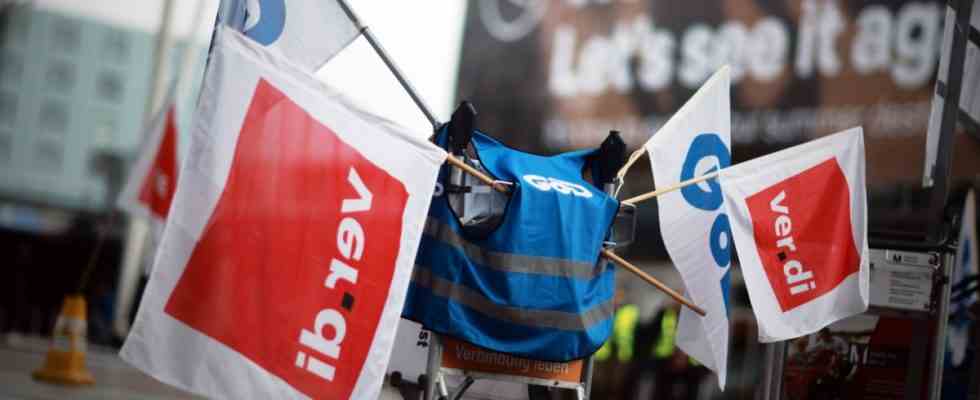Germany is facing a nationwide warning strike in the transport sector. Verdi and the railway and transport union (EVG) are calling on employees on the railways, at airports and in local public transport to stop working all day next Monday. Shipping and the federal highway company are also affected.
The calls in local transport relate to seven federal states: Baden-Württemberg, Hesse, Lower Saxony, North Rhine-Westphalia, Rhineland-Palatinate, Saxony and Bavaria. The call for the train and other train companies applies nationwide, this also applies to the airports with the exception of Berlin. This means that there will be numerous cancellations and delays almost everywhere in Germany. According to estimates by the airport association ADV, 380,000 passengers alone will be affected. The operating company Fraport announced that there will be no regular passenger traffic at Frankfurt Airport. With their appeal, the trade unions are confirming earlier media reports in which there was already talk of a large-scale traffic strike.
The background to the massive warning strikes are several collective bargaining rounds in which, from the unions’ point of view, nothing is progressing. Among other things, Verdi negotiates for the 2.5 million employees in the federal and municipal public sector, including bus, subway and tram drivers and some employees at airports. The EVG is struggling with several train companies for higher salaries, above all with Deutsche Bahn.
In view of the sharp rise in inflation, which was 6.9 percent last year and is expected to remain high this year, the unions are demanding particularly strong wage increases. Verdi is demanding 10.5 percent more, but also a minimum increase of 500 euros per month, which would mean a salary increase of up to 25 percent for many employees with lower incomes. EVG’s demand is even higher, at twelve percent and at least 650 euros more per month for the 180,000 employees at Deutsche Bahn.
In both rounds of collective bargaining, the offers made by employers have so far fallen well short of the expectations of the trade unions. The federal government and local authorities had promised public sector employees five percent more wages in two steps for the next 27 months, and there should also be a tax-free inflation compensation premium of 2,500 euros. Deutsche Bahn offers its employees the same.
When the crucial talks take place
Verdi boss Frank Werneke had rejected the offer of public service as “disrespectful”. EVG’s chief negotiator, Kristian Loroch, called Deutsche Bahn’s offer “outrageous”. The trade unionists are particularly bothered by the inflation compensation premium, which – unlike wage increases – is only paid once. They argue that it is of little help to employees because inflation remains high over the long term.
Verdi had repeatedly called for warning strikes in the past few weeks. In addition to airports, daycare centers, administrations and hospitals were affected. The employers criticized the calls as excessive. “They do not reflect the course of the negotiations,” said the chief negotiator of the municipal employers, Karin Welge (SPD), who is the mayor of Gelsenkirchen in the main office. Bahn HR Director Martin Seiler called on the EVG to continue the negotiations as soon as possible.
In the public sector, the decisive phase of collective bargaining begins next Monday when representatives of the federal government, local authorities and trade unions meet in Potsdam. The next talks between Deutsche Bahn and EVG are not expected to take place until the end of April. Until then, further warning strikes could follow.

